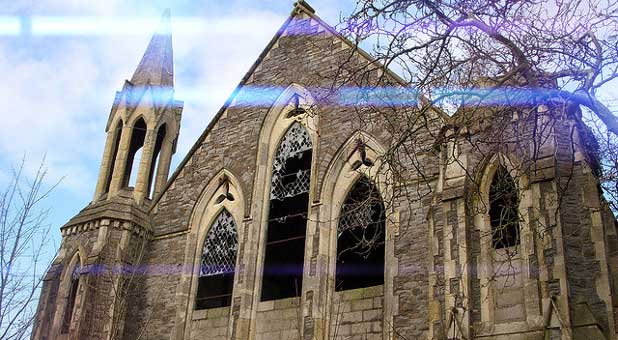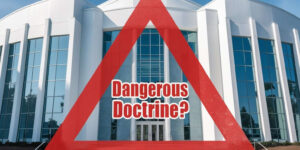Institutionalized Christianity: Friend or Foe?
“And seeing from afar a fig tree having leaves, He went to see if perhaps He would find something on it. When He came to it, He found nothing but leaves, for it was not the season for figs.In response Jesus said to it, ‘Let no one eat fruit from you ever again.’ Then Jesus went into the temple and began to drive out those who bought and sold in the temple, and overturned the tables of the money changers and the seats of those who sold doves.” (Mark 11:12-17)
Jesus cursed a fig tree just before He cleansed the temple and drove out all those who bought and sold there. The contrast in these parallel acts is striking. The cursing of the fig tree represented the destruction of a fruitless religious system. It served as a visual object lesson of what Jesus had come to do in the Jewish temple before He established the new covenant.
When Jesus cursed the fig tree He was cursing forms of religion that rob the heart of power. There are some concepts found in Christianity today that are robbing many of the true power of God. Allow me to briefly address these by using my limited knowledge of church history.
When Constantine, emperor of Rome, made Christianity the official religion of the Roman Empire in the fourth century, it marked the beginning of the institutionalization of the church. Constantine made the Church a state institution. From that point in time until the period of the dark ages (A.D. 1500) much of the church died. What we’ve seen in the last 500 years has been the renewal, revival and restoration of many truths that had been lost in the church age. Yet there remains a recovery and a resurrection of the effects of the institutionalization of the church. What do I mean by this?
There were two basic fallacies that were birthed during the institutionalization process. The first was the thought of the church being a building. Constantine built beautiful edifices and required Christians to attend. As someone once sarcastically said: “The church building became a theatre, the ministers the actors, and the tithes and offerings were the admittance fee.” In this way Christianity became the official religion of the Roman Empire.
Up until that time Christians had met in homes. This change in regards to Christianity and the Church meeting in large elaborate buildings affected the mindset of multitudes of people during the Roman Empire and in future generations. The issue is not the location or venue of where the church meets so don’t get hung up there.
It doesn’t matter where the church gathers—in a big building, a small building, a house, a garage, a barn, a tent, or under a tree. The bigger issue is in possessing a New Testament mindset that the church is not a building, but it is the people who are the temple of the living God. This may sound too simple, but this mindset began restricting the gospel to the four walls of a building instead of taking it into public life. It killed the evangelistic fervor of the church. The church is not a building.
We could also add, according to the above passage of scripture, that the church is not a business. As soon as the church becomes more of a business that deals with the dollar in mind, or into a charitable organization that is content with humanitarian projects only, it will begin to wither and die, just as the fig tree Jesus cursed. The church, above all else, has been called to be a soul-saving organism. If the devil can institutionalize it and turn into a powerless religious system it will no longer serve the purposes of God.
The second fallacy that developed and spawned from the first is the thought that the people are an audience. Beginning with the rule of Constantine and the Roman Empire, a great distinction was made in Christianity between the clergy and the laity. This was definitely the greater tragedy during the institutionalization of the church because it shifted the personal responsibility of the individual believer in the church over to the institution and its officers, and he became a spectator instead of a participator. The people are not an audience.
These mindsets have robbed so many of the truth and the power of the gospel, not only centuries ago, but even today. Christianity becomes institutionalized when a building becomes more important than the people, when money becomes more important than the Spirit’s workings, when attendance takes precedence over effectiveness, and organization and structure are emphasized more than relationship.
The church is a living organism. It grows from within. You cannot produce a spiritual quality in the church from the outside in. Changing outward forms and structures does not add quality to the church. Adding a new mission statement, changing the worship style or name of a church are all false and unproductive ways of producing quality. Spiritual quality can only be produced from the inside out.
The fig tree that Jesus cursed had leaves but no fruit. In other words, the outside looked good, but a closer inspection by Jesus exposed the tree’s flaws and lack of fruit. This was the problem in the temple. It looked beautiful and unblemished on the outside but was unclean and defiled on the inside.
These mindsets can immobilize the gospel and hinder its effectiveness in the public arena. It can also create too large of a distinction between what is called the clergy and laity. Just like an unused muscle, a Christian will begin to weaken and backslide when he does not function in his gift or calling.
What would happen if all believers would function in their place and in their God-given abilities and grace? The devil knows he cannot stop God from distributing these gifts so he seeks to slow down or stop the joint operation of them. He hinders the freedom to exercise these gifts. And he does it through the formation of a mindset that tells the body of Christ that their ministry is insignificant compared to that of a pastor or another five-fold minister.
Every believer is the temple of the Holy Ghost. Every believer has been given gifts to function as a vital member of the body of Christ. Every believer is set apart for the purposes of God.
Bert M. Farias, founder of Holy Fire Ministries, is the author of The Real Gospel and co-host of the New England Holy Ghost Forum. He is a missionary evangelist carrying a spirit of revival to the church and the nations. Follow him at Bert Farias on Facebook or @Bertfarias1 on Twitter.






































